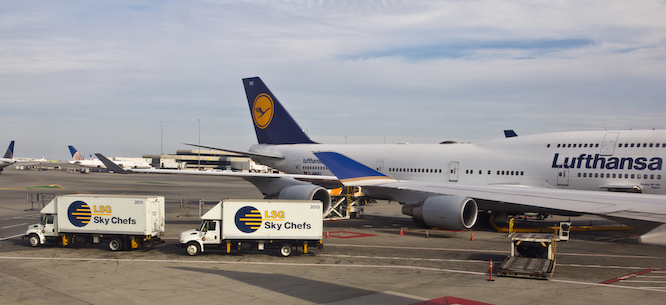In “Panic Mode” and Waiting for More Relief
In “Panic Mode” and Waiting for More Relief
A couple employed by an airport catering company haven’t worked since March. They’re struggling to make ends meet.

[contentblock id=coronavirus]
Bobby Kirkpatrick, a fifty-eight-year-old truck driver for the airline industry in Charlotte, North Carolina, felt the pandemic approaching on the horizon like a low-flying plane as it started in China and migrated to the West Coast. When COVID-19 hit California, he started stockpiling household supplies.
“I started spending a little money, just preparing my family. . . . Then the pandemic got closer to me. It got to New York. And that’s when I really started saying, this is serious. This is serious.”
But no one at his workplace, the airport catering company LSG Sky Chefs, seemed to be taking the coronavirus seriously, even though they were at the heart of the aviation infrastructure transporting the virus around the world. So Kirkpatrick, who has worked there for nearly forty years and helped unionize with UNITE HERE in the mid-1990s, approached the management. He recalled:
I took it upon myself as the union rep to say, ‘Look, y’all need to have meetings with people and let us know what’s going to happen . . . we need to start [talking about] the scenarios of anything disastrous [happening]. . . . Y’all need to have at least a roundtable with the hourly employees [so they] know where they stand.’ But by the time that they did, it was coming to the East Coast. It hit New York hard, and then it came on down to the southern states. And then the airline industry flopped. The travel industry flopped. The hospitality industry flopped. Because they tried to get a grip on it very late. Everything should’ve stopped at the West Coast, I think.
Now he and his fiancée, who also works for Sky Chefs, have not worked since late March. They expect to be called back eventually, but Kirkpatrick has never had to stop working for so long—not even when September 11 devastated the airlines, or when the Great Recession sank the travel industry.
While they waited for their unemployment benefits to arrive, his family struggled to stretch their federal stimulus checks. Furthermore, with car and mortgage payments soon due, Kirkpatrick said, “I’m in that panic mode. We still got a little bit of cash. But I’m nervous and up late at night, up early in the morning, and I’m pacing, and all that takes a toll. Because the human body’s not made for all that stress. That stress brings out a lot of things.”
He cut back on household expenses: buying ground beef instead of seafood, keeping his phone off to avoid racking up charges, trying not to use too much water, and cutting cable. He only kept his internet service so that his children could continue with their remote schooling.
“I cook every day, but I don’t waste anything,” he said. “I cooked last night, and what I cooked last night, we had for breakfast this morning.”
Last week, Kirkpatrick’s first unemployment insurance check finally came. But it does not cover all his expenses, so he is still drawing on his savings.
The government’s disastrous response to the pandemic, he said, showed “the moral fiber of our country is backwards, because of the leadership’s . . . blabbering nonsense.”
“My very first vote in my life was for a Republican,” he recalled, after his neighbor had convinced him that Ronald Reagan was “going to help all Americans. . . . I never voted Republican again. But at that time, Republicans were the party of moral standing. And now, it’s the party of no morals, because the leadership has no morals.”
Kirkpatrick wants to see additional relief in the next round of federal stimulus—like a Democratic proposal to extend the $1,200 one-time stimulus to a $2,000 monthly stipend. But he fears that
when the Republicans get a hold [of the bill], it’s going to be cut to benefit millionaires. Not me, [not] the people who really need it. A millionaire doesn’t need $1.6 million in refunds. A person making $30,000 a year could use this [stimulus payment] per month, to make sure he can still live. Because the government doesn’t want to have a situation on their hands where they have a street full of families that are homeless.
He continued:
The leaders are going to have to actually lead [in order to] to take care of the essential workers and the American working person, because the American working person gets it harder than the millionaires. Millionaires can stay at home. In fact, millionaires can hire people to do what we’re doing. If you need somebody to cook for you, you can hire somebody. . . . I’ve got to get out and work. A millionaire isn’t worried about a mortgage, because he just bought his house. . . . He might have more than one, or two or three homes. . . . I can’t afford to do that. I’ve got one home. And this home has life in it.
Michelle Chen is a member of Dissent’s editorial board and co-host of its Belabored podcast.






